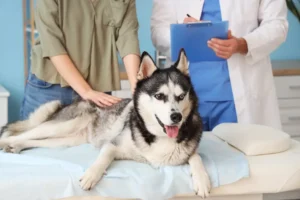Digestive issues in dogs can be tricky – one day it’s a mild upset stomach, the next it’s persistent diarrhea or unexplained weight loss. If your dog’s tummy troubles aren’t going away, they might be more than just an off day. One possible cause? Inflammatory bowel disease in dogs (IBD). While the name sounds serious (and it can be), IBD in dogs is a chronic condition that is manageable with the right care.
What Is Canine Inflammatory Bowel Disease?
Inflammatory bowel disease in dogs refers to a group of gastrointestinal disorders that cause chronic inflammation in the lining of the digestive tract. This inflammation interferes with normal digestion and nutrient absorption, which can result in ongoing issues like vomiting, diarrhea, and weight loss.
While IBD in dogs shares some similarities with other GI conditions, it’s not the same as a passing stomach bug or food intolerance. This is a long-term issue that requires veterinary diagnosis and consistent management.
IBD vs. IBS vs. Crohn’s Disease in Dogs
Though often confused, IBD, IBS, and Crohn’s disease in dogs are not the same.
- IBD (Inflammatory Bowel Disease) is a chronic immune-mediated condition that causes inflammation in the GI tract and can lead to lasting damage.
- IBS (Irritable Bowel Syndrome), while sounding similar, is generally milder and linked to stress or anxiety. It doesn’t involve actual inflammation or structural changes.
- Crohn’s disease in dogs is rare but considered a specific and more severe form of IBD involving deeper layers of the intestines.
Proper diagnosis is key because the treatment varies depending on the condition.
What Causes Inflammatory Bowel Disease in Dogs?
 The exact cause of inflammatory bowel disease in dogs isn’t fully known, but most experts believe it stems from an overactive immune response in the GI tract. In simple terms, a dog’s immune system mistakes something in the gut (like food, bacteria, or even its own cells) as a threat, launching an attack that results in inflammation.
The exact cause of inflammatory bowel disease in dogs isn’t fully known, but most experts believe it stems from an overactive immune response in the GI tract. In simple terms, a dog’s immune system mistakes something in the gut (like food, bacteria, or even its own cells) as a threat, launching an attack that results in inflammation.
Several factors may contribute, including:
- Genetics: Some breeds are more prone to IBD, including Boxers, German Shepherds, French Bulldogs, and Soft-Coated Wheaten Terriers.
- Food sensitivities or allergies
- Bacterial overgrowth or imbalances
- Chronic stress or underlying infections
Dog IBD is a complex condition without one clear cause, but understanding the triggers can help guide treatment.
What Are the Clinical Signs of IBD?
Because IBD affects the digestive tract, the symptoms often center around the gut. But they can vary depending on where the inflammation is most severe. Common symptoms of IBD in dogs include:
- Recurring or chronic diarrhea (with or without blood/mucus)
- Vomiting
- Weight loss
- Loss of appetite
- Flatulence or noisy digestion (gurgling sounds)
- Lethargy
- Abdominal discomfort
These IBD symptoms in dogs may come and go or worsen over time. Some IBD dogs may seem fine for weeks before having a sudden flare-up. If your dog is showing multiple signs consistently, it’s time to talk to your vet.
How Is IBD in Dogs Diagnosed?
There’s no single test for canine IBD, so diagnosis usually involves ruling out other conditions. Your veterinarian will likely begin with:
- Bloodwork and urinalysis to assess general health
- Fecal exams to check for parasites or infections
- Imaging like X-rays or ultrasound to look for structural issues
- Diet trials to rule out food allergies or intolerances
The most definitive way to diagnose IBD is through a biopsy, which involves taking a small tissue sample from the intestinal lining. This allows the vet to look for specific types of inflammation and rule out other diseases, such as cancer.
How Is IBD in Dogs Treated?
When dealing with IBD in dogs, treatment is all about managing the inflammation and easing symptoms. There’s no cure, but with the right combination of therapies, many dogs go on to live full, happy lives. Most treatment plans include a mix of dietary changes, medication, and supportive care.
Deworming
Even if parasites aren’t detected, your vet may start with a deworming protocol. That’s because intestinal parasites like ringworm or tapeworm infections can cause similar symptoms – and in some cases, worsen existing inflammation. Deworming helps eliminate this possible factor early on.
Diet Management
Food is often at the center of IBD dog treatment plans. Many vets recommend a diet trial with:
- Novel proteins (like rabbit or duck) the dog hasn’t eaten before
- Hydrolyzed protein diets that are less likely to trigger immune responses
- High-fiber or easily digestible formulas, depending on the symptoms
It may take several weeks to see improvement, so patience is key. Keep in mind that treats and table scraps should be avoided during this time.
B-Vitamin Supplementation
Dogs with IBD often have trouble absorbing nutrients, including vitamin B12 (cobalamin). A deficiency in B12 can cause fatigue, poor appetite, and other complications. Supplementing this essential vitamin can support your dog’s overall health and improve energy levels.
Immunosuppressive Medications
If dietary changes aren’t enough, your vet may prescribe medications to control inflammation. The first line of defense is usually corticosteroids, such as prednisone, which can reduce swelling in the GI tract and calm the immune response.
Do Corticosteroids Cause Side Effects in Dogs?
Yes, corticosteroids can lead to side effects, especially when used long-term. These might include:
- Increased thirst and urination
- Increased appetite
- Panting
- Behavioral changes
- Higher risk of infections
That said, many dogs tolerate steroids well with proper monitoring, and the benefits often outweigh the risks in the early stages of treatment.
Does This Mean That I Will Be Giving Steroids to My Dog for the Rest of His Life?
Not necessarily. Some dogs can be weaned off steroids or moved to lower doses over time. Others may need long-term maintenance at the lowest effective dose. Your vet will determine what’s best for your IBD dog, with the goal of minimizing medication while keeping symptoms under control.
Are Other Anti-Inflammatory Drugs Used to Treat Dog IBD?
If steroids aren’t effective or cause complications, your vet may try other medications such as:
- Budesonide – a steroid with fewer systemic effects
- Cyclosporine – an immunosuppressive drug
- Chlorambucil – typically used in more resistant or severe cases
These medications may be introduced under the guidance of a specialist, especially if your dog isn’t responding to standard therapies.
What Is the Prognosis for Dog IBD?
With proper care, many dogs with IBD can live comfortably for years. Regular monitoring and occasional adjustments to treatment are often part of the journey. If the condition is caught early and well-managed, dogs can have an excellent quality of life.
However, for dogs with severe symptoms or end-stage IBD, the outlook can be more uncertain. At this point, the focus often shifts toward comfort and supportive care.
When to See the Vet for Dog Diarrhea or Other Digestive Issues
Every dog gets an upset stomach now and then – but when diarrhea, vomiting, or appetite loss becomes frequent or long-lasting, it’s time to get help. Chronic symptoms could signal inflammatory bowel disease in dogs or another underlying issue that needs medical attention.
Don’t wait until your dog is severely dehydrated or losing weight. Early intervention often leads to better outcomes, and faster relief for your pup.
Need Immediate Care? Find an UrgentVet Near You Today!
From understanding IBD symptoms in dogs to knowing when to seek help, staying informed is key. With proper management, your pup can still live a vibrant and comfortable life, even with a chronic condition. If you ever need urgent GI care, UrgentVet Pet Clinic is here to support your dog’s health, every step of the way.
If your dog is struggling with digestive issues and your regular vet isn’t available, UrgentVet offers walk-in and same-day urgent veterinary care services for non-life-threatening concerns. Whether it’s persistent diarrhea, mild dehydration, or suspected IBD in dogs, we’re here when your pet needs prompt, compassionate help.
Find your nearest UrgentVet location to get high-quality care for your pet today!
FAQs About Dog IBD
If your dog has been diagnosed with IBD or is showing possible signs, here are answers to some of the most common questions:
Is IBD in dogs painful?
IBD in dogs can be painful. While not all dogs show signs of discomfort, some may experience cramping, bloating, or distress, especially during flare-ups. Pain management may be part of your vet’s care plan if needed.
How long does it take for prednisone to work in dogs with IBD?
Many dogs with IBD begin to show improvement within one to two weeks of starting prednisone treatment, but full results may take longer. It depends on the severity of the condition and how well your dog responds.
What are the best foods for dogs with IBD?
There’s no one-size-fits-all answer, but many dogs do well on novel protein diets, hydrolyzed formulas, or prescription GI foods. Always work with your vet to find the right diet for your dog’s specific needs.
Is IBD common in dogs?
Yes, IBD is common in dogs, especially in middle-aged to older dogs. It’s one of the more frequent causes of chronic GI symptoms like vomiting and diarrhea.
Is IBD in dogs curable?
No, dog IBD isn’t considered curable, but it is manageable. With a tailored plan and regular check-ins, many dogs do very well long term.
What are the symptoms of end-stage IBD in dogs?
Signs of end-stage IBD in dogs include severe weight loss, persistent vomiting and diarrhea, lack of appetite, and failure to respond to treatments. In these cases, comfort care becomes the top priority.
How do you test for IBD in dogs?
A full diagnosis typically includes lab work, imaging, and in some cases, intestinal biopsies. These help your vet rule out other issues and determine the best treatment path.
Image Credit: Pixel-Shot / Shutterstock
[/vc_column_text][/vc_column][/vc_row]





